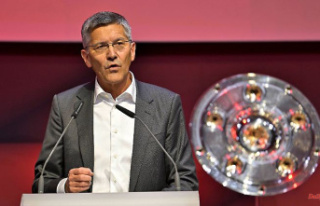At the federal party conference in Bonn, the Green Party gets approval for arms deliveries to Ukraine. The isolated dissenting voices are now only a minority position in a party that is being carried by a new generation.
How close the war in Ukraine is is quickly forgotten. Green MEP Sergey Lagodinsky was born in the Soviet Union. Earlier this week he personally experienced the large-scale rocket fire by Russia in a Kiev basement. On Saturday he will be standing on the stage at the Green Party Congress in Bonn's World Conference Center and will explicitly refer to this experience. "Yes, we are a peace party, we are a peace-preserving party. Peace must also be defended. We also don't defend peace with amendments," he reproaches the previous speaker, grassroots activist Karl-Wilhelm Koch. "You can't defend yourself against the second largest army in the world with sunflowers!"
The protracted applause for Lagodinsky anticipates the result of the several-hour debate on foreign and security policy: the Greens are overwhelmingly behind the arms deliveries to Ukraine, even though they entered the government a year ago with the election promise that Germany would not have any weapons allowed to export more to conflict zones.
An emergency motion by the federal executive committee, which justifies military support for Ukraine, finds a large majority in Bonn. Proposed amendments calling for a total halt to arms deliveries or at least more diplomatic efforts for a ceasefire met with little support.
The unconditional pacifists, who often adorn themselves with the white dove of peace on a blue background in Bonn, are a minority even on the left wing of the Greens. Of course, this is evidence of a profound change in the party over the past 40 years. Party congress veteran Koch is very aware of this change: "What would Heinrich Böll and Petra Kelly think?" he asks the delegates, only to then answer himself: "They would rotate in their graves."
However, most of the party members who met in Bonn may not have got to know the iconic founding members. Around 40 percent of the more than 800 delegates are taking part in a federal delegates' conference for the first time. The commemoration of the recently deceased party icon Hans-Christian Ströbele is symbolic of the generation change. The first Green MP with a direct mandate had been at odds with the arms deliveries. Funeral speaker Jürgen Trittin omits this aspect in a moving speech and recalls that the younger Ströbele supported the purchase of weapons for Central American revolutionaries.
The party, whose membership has more than doubled to around 125,000 in recent years, is now being shaped by a third and fourth generation. Even if some people are bothered by the narrowing down to military issues in the debate, even the Green Youth is largely united behind the arms deliveries. What's more, the party is largely proud of the fact that its top representatives warned early on about energy dependence on Russia and Putin's imperialist ambitions. In the spring of 2021, when he was still party chairman, the current Federal Minister of Economics, Robert Habeck, called for the strengthening of Ukraine's defense capabilities.
In her speech, Federal Foreign Minister Annalena Baerbock said: "Actually, this war shouldn't be here, but it is here. And that's why we are taking on this responsibility." The Greens would not have chosen this situation. "What we don't do is, unlike the previous government, duck away at this time."
Party leader Omid Nouripour also draws on his own experiences in his speech. "Every child is scared when they're sitting in a bomb cellar - I know what I'm talking about," says Nouripour, who was born in Tehran, referring to the first Gulf War. Nouripour, like his co-chairman Ricarda Lang on Friday, is in favor of more arms deliveries to Ukraine "because we see that these arms save lives". And: "I know it's not easy for a peace party, but peace isn't easy."
The party executive also sets the tone with the selection of the guest speakers: Oleksandra Matvichuk from the Ukrainian organization Center for Civil Liberties and Irina Scherbakowa from the Memorial Foundation, which has since been banned in Russia. Both institutions were honored with the Nobel Peace Prize this year. In a video sent in, Matvichuk reports interviews with hundreds of people who were beaten and raped by the Russian occupiers, had their fingers cut off, locked in wooden boxes and tortured with electricity. The Russian Sherbakova said on stage: "If you want peace, you have to make sure that Ukraine gets everything - and I mean everything - it needs for defense without delay." Russia must lose militarily in order to free itself from its own dictatorship.
Not speaking in Bonn, of all people, is the politician who was the first to stick his head out for the Greens to vigorously demand heavy weapons for Ukraine: Toni Hofreiter. The former parliamentary group leader, who was passed over when the ministerial posts were filled last autumn, is nevertheless a sought-after discussion partner for the media, delegates and party congress guests. On the other hand, there are no prominent opponents of the new, green enthusiasm for arms deliveries to the Ukraine in Bonn. The Greens continue to see themselves as a peace party, but in a very different way than in the days of Böll, Kelly and Ströbele.












